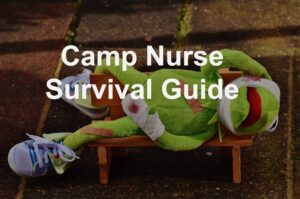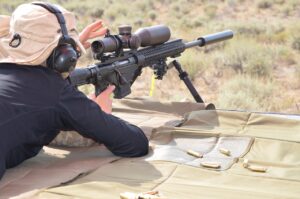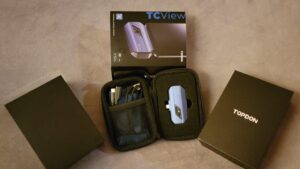I was volunteered to be a camp nurse many years ago. I had experience as both a nurse and an EMT but had always enjoyed the luxury of having a supervisor over me or being just a few miles from additional help. Volunteering as a camp nurse made me a little nervous, but I have loved the experience. Working with kids has been a huge blessing and I’ve enjoyed every camp.
Setting up a system that works for me has taken several years to refine. If you’re looking for tips for being a nurse at camp, I hope these help.
This system likely won’t work for everyone but should be a good starting spot to begin your journey as a camp nurse.
Camp nurse med pass
Checking in meds
My system is a little slow, but very thorough and tries to make handing out meds foolproof and accurate. When the kids arrive, I will type up their instructions into excel and print them off so I have a copy of all the meds and can carry it with me at all times.
I put each child’s medication into a large Ziploc bag with their name and the instructions on it as well.
On each bag, I put a sticker for the time of day they take the medication. For example, blue for the morning, yellow for lunch, green for supper, and orange for bedtime. I put a star or other sticker for the PRN medications.
With this system, I can rapidly sort through all the meds before going to breakfast and pull out just the bags with breakfast meds. I almost always keep the PRN medications on me if I leave the nurse’s station, so I don’t have to hike back to get the med they want. You may need to use your judgment on some items.
Check-in tip
During check-in, place each child’s meds in a plastic Ziplock bag with their name on it, have them hold it, and take a picture of them and the medication/Ziplock bag. It makes it much easier to track the right kid down and verify you have the right one if that becomes a problem.

Prepping for med pass
Don’t underestimate how many will be on medications. For a typical camp, about a third of children at camp take medication daily. About half of the children will bring some form of medication. For a special needs camp, the number will be much higher.
Brush up on some of your pharmacology before you go.
Some of the most common medications kids bring to camp are for allergies, ADHD, and other behavioral meds.
Foster children can require extra attention
Childhood should be safe, full of learning and disciplined, yet fun and carefree, kind of like camp. Unfortunately, not every child gets to grow up that way. Foster children may need some extra attention, and they’ll often have more meds. Their meds can also greatly affect their activity level and emotions.
Look out for black box warnings.
Some of their meds may increase suicidal thoughts.
Abilify, Seroquel, Risperdal, and Zyprexa are common antipsychotics for foster children. For a brief overview of them, check out this article by ABC.
Some of the medications cause extreme drowsiness. If they are staying up past their normal bedtime (who isn’t at camp), you may need to consider giving that med at a later time.
Photosensitive meds (more sunburns)
Some medications make you more susceptible to sunburn. While there are several photosensitive meds out there, like some antibiotics and hydrochlorothiazide, you’ll want to pay close attention to the tricyclic antidepressants. They will often prescribe these to children for depression and anxiety.
This doesn’t mean they can’t play with the rest of the kids, but they will be extra likely to sunburn. Make sure they have plenty of sunscreen, allow them to sit out on outside activities if they want, and have plenty of aloe handy.
Get the best laundry soap for your next adventure!
- Smaller & lighter than laundry pods
- Dissolves rapidly
- Less likely to be eaten by teenagers (hopefully)
- Does not melt
- 10 loads of detergent donated for every package purchased (See our review)
General camp nurse tips

Parents won’t answer your call
One of the most frustrating things during camp is contacting the family to ask a question or get permission to give medication. Nine out of ten times, I will be sent to voicemail repeatedly. When they finally pick up on the third or fourth call, I quickly explain that I’m the camp nurse, but also that it isn’t a life or death emergency.
Have someone who knows the parent, like a counselor or church friend, make the call. When family members recognize the number, they’re much more likely to pick up.
Have a pre-approved medication process.
When the camp registration forms go out, we ask each parent to select if it’s okay for their children to have various medications without a call from the nurse. This preapproval process for some meds has saved me countless phone calls over the years.
Typical pre-approved meds include ibuprofen, anti-itch cream, tums, and several other over-the-counter medications.
Be easy to find
When an emergency happens at camp, you need to be easy to find. One way you can do this is to always stay in your nurse’s cabin. To me, this is a really boring option. I like to roam around and hang out where all the injuries happen. Did I say injuries? I meant action. The recreation field is my number one patient referral location.
Have a sign on the nurse’s station
The camps I’ve been to all have laminated cards you can put on the nurse’s station door. Update the card before you head out to a location. There should be a sign for every place you go. If not, just write it down on a piece of paper and put it on the door.
I’ve stuck two signs up before if I’m going from one place to the next.
Use a bicycle flag or other bright marker
One of the best things I’ve seen that could help you is carrying around a bicycle flag. This bright orange flag is stuck in the ground outside whatever building you are in. If you’re in the chapel or the dining hall, plant the flag in a highly visible location.
Make sure you take it with you when you move locations! Make sure the staff knows what it is for too.
Be easy to contact
If you are using your cellphone, make sure all the counselors and staff members have your number. Cell phone coverage at many camps can be poor to non-existent. You may find it beneficial to carry a radio with you.
You’ll have less time to eat
Most of the med passes are with meals. Your busiest times will be breakfast, supper, and bedtime. You’ll get a lot of extra visits during mealtime as well. Most of them will be minor things that didn’t warrant a trip to the nurse’s station during a fun activity or when it was out of the way. It can be difficult trying to eat while passing out meds and doctoring up all the extra things that come up.
I always bring a small first aid kit with me everywhere I go, especially for meals. The most asked for items are bandaids, wraps, and ibuprofen.
You aren’t only treating children at camp
Adults get sick, and elderly volunteers fall. Anxiety attacks, dehydration, low/high blood sugar, potential heart attacks, and suspected strokes all happen. Goodness, isn’t camp great? In all seriousness, just because you’re at camp doesn’t make you immune from dealing with other things people go to the ER for.
Know the camp layout and names of the buildings
A lost camp nurse will have trouble taking care of the girl that fell off the top bunk if you don’t know where the cabin is and what it’s called. Kids and counselors are pretty good at flagging you down, but try to know the basic layout.
Take a picture of the camp map so you always have it. Do the same with the schedule and the list for which group each kid is in. This will come in handy for tracking down the kids that didn’t come to you to get their meds.
As a camp nurse, you should know the closest hospital and transport options
Make sure you know how close the nearest hospital is. How close is the nearest ambulance?
The camp director or other year-round staff can likely tell you how long an ambulance takes and where they land a helicopter.
If you have an actual emergency and need help faster than the ambulance can get there, let the 911 dispatcher know you are a nurse and need a helicopter if one is available. Even just alerting the flight crew of the possibility of being needed can save valuable time.
Parents can ask you to do weird things. Investigate and go with your gut.
I had a parent give me a med for her children to take whenever they asked for it to keep them from getting sick. It turned out it was a homeopathic recipe she made herself with vodka.
You have a license and common sense. If something feels wrong or off, find out why.
Give it a shot
Being a camp nurse is one of the highlights of my year. You’ll learn a lot in the first year or two. Having an EMS or ER friend to call may be helpful. Moms are also a great resource. They’ve been treating banged-up and sick kids since before you were born.
Ultimately, it’s an amazing experience and a fantastic way to enjoy the summer!
Join our email to hear about new resources to help you stay on top of severe weather outbreaks
- How to Shelter in Place During a Nuclear Event
- How to sleep in your car overnight
- How to prepare for power outages
- Preparing for Severe Weather
- Faith in Action: Responding to Trump’s Reduction in Humanitarian Aid
- How to Help Someone Who is on Fire
- How To Get Help When 9-1-1 Is Down
- Does a Solar Eclipse Really Warrant a State of Emergency?
- The Coming Digital Apocalypse?
- Disaster Survival: Do These 3 Things Within 60 Seconds
- 5 Disaster Relief Tips for a Major Earthquake Response
- Can We Shoot the Chinese Balloon Down?
- Incident Management Team: Tips for a Successful Deployment
- TC001 Best New Thermal Camera? Review for TOPDON TCView
- 5 Ways To Stop Overpaying For Healthcare
- Preparing Your Pets for Disaster


















